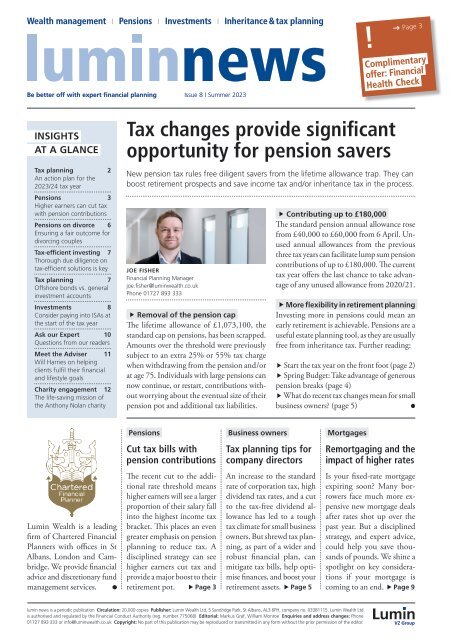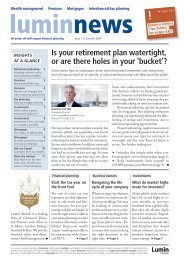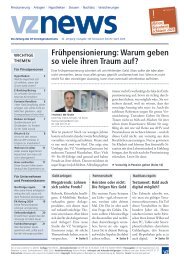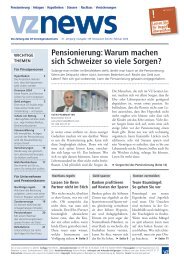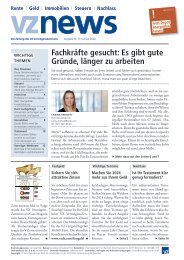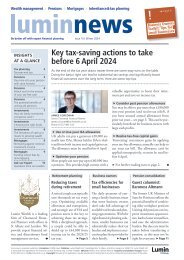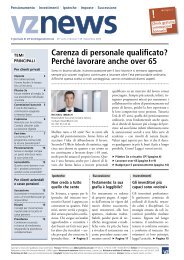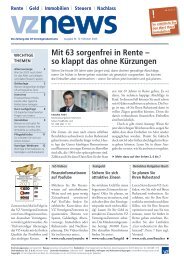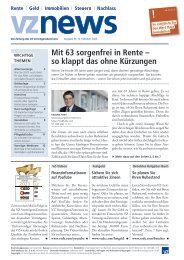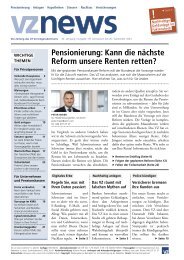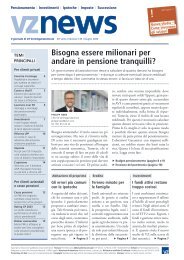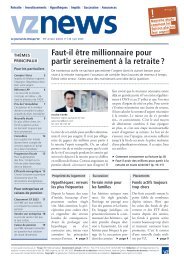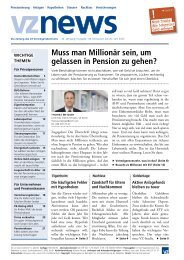lumin news Issue 8 / Summer 2023
You also want an ePaper? Increase the reach of your titles
YUMPU automatically turns print PDFs into web optimized ePapers that Google loves.
Wealth management I Pensions I Investments I Inheritance & tax planning<br />
Be better off with expert financial planning <strong>Issue</strong> 8 I <strong>Summer</strong> <strong>2023</strong><br />
!<br />
Page 3<br />
Complimentary<br />
offer: Financial<br />
Health Check<br />
INSIGHTS<br />
AT A GLANCE<br />
Tax planning 2<br />
An action plan for the<br />
<strong>2023</strong>/24 tax year<br />
Pensions3<br />
Higher earners can cut tax<br />
with pension contributions<br />
Pensions on divorce 6<br />
Ensuring a fair outcome for<br />
divorcing couples<br />
Tax-efficient investing 7<br />
Thorough due diligence on<br />
tax-efficient solutions is key<br />
Tax planning 7<br />
Offshore bonds vs. general<br />
investment accounts<br />
Investments8<br />
Consider paying into ISAs at<br />
the start of the tax year<br />
Ask our Expert 10<br />
Questions from our readers<br />
Meet the Adviser 11<br />
Will Harries on helping<br />
clients fulfil their financial<br />
and lifestyle goals<br />
Charity engagement 12<br />
The life-saving mission of<br />
the Anthony Nolan charity<br />
Tax changes provide significant<br />
opportunity for pension savers<br />
New pension tax rules free diligent savers from the lifetime allowance trap. They can<br />
boost retirement prospects and save income tax and /or inheritance tax in the process.<br />
JOE FISHER<br />
Financial Planning Manager<br />
joe.fisher@<strong>lumin</strong>wealth.co.uk<br />
Phone 01727 893 333<br />
Removal of the pension cap<br />
The lifetime allowance of £1,073,100, the<br />
standard cap on pensions, has been scrapped.<br />
Amounts over the threshold were previously<br />
subject to an extra 25% or 55% tax charge<br />
when withdrawing from the pension and /or<br />
at age 75. Individuals with large pensions can<br />
now continue, or restart, contributions without<br />
worrying about the eventual size of their<br />
pension pot and additional tax liabilities.<br />
Contributing up to £180,000<br />
The standard pension annual allowance rose<br />
from £40,000 to £60,000 from 6 April. Unused<br />
annual allowances from the previous<br />
three tax years can facilitate lump sum pension<br />
contributions of up to £180,000. The current<br />
tax year offers the last chance to take advantage<br />
of any unused allowance from 2020/21.<br />
More flexibility in retirement planning<br />
Investing more in pensions could mean an<br />
early retirement is achievable. Pensions are a<br />
useful estate planning tool, as they are usually<br />
free from inheritance tax. Further reading:<br />
Start the tax year on the front foot (page 2)<br />
Spring Budget: Take advantage of generous<br />
pension breaks (page 4)<br />
What do recent tax changes mean for small<br />
business owners? (page 5)<br />
Pensions<br />
Business owners<br />
Mortgages<br />
Cut tax bills with<br />
pension contributions<br />
Tax planning tips for<br />
company directors<br />
Remortgaging and the<br />
impact of higher rates<br />
Lumin Wealth is a leading<br />
firm of Chartered Financial<br />
Planners with offices in St<br />
Albans, London and Cambridge.<br />
We provide financial<br />
advice and discretionary fund<br />
management services.<br />
The recent cut to the additional<br />
rate threshold means<br />
higher earners will see a larger<br />
proportion of their salary fall<br />
into the highest income tax<br />
bracket. This places an even<br />
greater emphasis on pension<br />
planning to reduce tax. A<br />
disciplined strategy can see<br />
higher earners cut tax and<br />
provide a major boost to their<br />
retirement pot. Page 3<br />
An increase to the standard<br />
rate of corporation tax, high<br />
dividend tax rates, and a cut<br />
to the tax-free dividend allowance<br />
has led to a tough<br />
tax climate for small business<br />
owners. But shrewd tax planning,<br />
as part of a wider and<br />
robust financial plan, can<br />
mitigate tax bills, help optimise<br />
finances, and boost your<br />
retirement assets. Page 5<br />
Is your fixed-rate mortgage<br />
expiring soon? Many borrowers<br />
face much more expensive<br />
new mortgage deals<br />
after rates shot up over the<br />
past year. But a disciplined<br />
strategy, and expert advice,<br />
could help you save thousands<br />
of pounds. We shine a<br />
spotlight on key considerations<br />
if your mortgage is<br />
coming to an end. Page 9<br />
<strong>lumin</strong> <strong>news</strong> is a periodic publication Circulation: 20,000 copies Publisher: Lumin Wealth Ltd, 5 Sandridge Park, St Albans, AL3 6PH, company no. 03381115. Lumin Wealth Ltd<br />
is authorised and regulated by the Financial Conduct Authority (reg. number 775068) Editorial: Markus Graf, William Monroe Enquiries and address changes: Phone<br />
01727 893 333 or info@<strong>lumin</strong>wealth.co.uk Copyright: No part of this publication may be reproduced or transmitted in any form without the prior permission of the editor.
Page 2 <strong>lumin</strong> <strong>news</strong> 8 / summer <strong>2023</strong><br />
Start the tax year on the front foot<br />
The earlier you plan, the greater your choices and the more potential there is<br />
to maximise your financial efficiencies and make tax savings. Here we provide an<br />
overview of key factors to consider in the <strong>2023</strong>/ 24 tax year.<br />
MARTIN COTTER<br />
Managing Director<br />
martin.cotter@<strong>lumin</strong>wealth.co.uk<br />
Phone 01727 893 333<br />
Now could be a good time<br />
to hone in on start-of-thetax-year<br />
basics; namely implementing<br />
easy tax wins and<br />
conducting a review of your<br />
finances. Here are some key<br />
things to consider:<br />
ISA and pension<br />
allowances<br />
Thousands of pounds can<br />
be saved each tax year by<br />
doing the basics well. Each<br />
adult can pay £20,000 into<br />
an ISA annually. Under-16s<br />
have a £9,000 annual allowance,<br />
while those who are 16<br />
or 17 can additionally contribute<br />
up to £20,000 into an<br />
adult cash ISA equivalent.<br />
We recommend contributing<br />
as soon as you can, as<br />
leaving it to the end of each<br />
tax year will see you miss out<br />
on significant growth over<br />
time. Flexible ISAs allow you<br />
to withdraw money and replace<br />
it during the relevant<br />
tax year, without affecting<br />
your ISA allowance.<br />
It’s a similar story when<br />
it comes to pensions. Earners<br />
should consider paying in at<br />
the start of the tax year (not<br />
applicable for those subject<br />
to a tapered annual allowance)<br />
and explore whether<br />
they are eligible to ‘carry forward’<br />
any unused annual allowance<br />
from previous tax<br />
years. Non-earners can contribute<br />
up to £2,880 (net) to<br />
personal pensions and benefit<br />
from tax relief. The standard<br />
annual allowance has risen<br />
from £40,000 to £60,000, a<br />
Key factors for the <strong>2023</strong>/24 tax year<br />
Facts & stats<br />
50% increase that provides a<br />
valuable incentive for certain<br />
savers to contribute more to<br />
their pension.<br />
Harvesting gains<br />
Each adult currently benefits<br />
from a capital gains tax<br />
Annual Exempt Amount of<br />
£6,000 (this will be cut to<br />
£3,000 from April 2024).<br />
This can be used to harvest<br />
investment gains annually<br />
and avoid or reduce a tax<br />
charge. The allowance must<br />
be used before 5 April 2024,<br />
or it will be permanently<br />
lost. The timing of realising<br />
gains (in line with market<br />
sentiment) is an important<br />
consideration.<br />
Action & timing<br />
ISA<br />
£20,000 allowance per adult;<br />
£9,000 for under-16s<br />
Consider contributing as soon<br />
as you can<br />
Pension for earners Consider topping up your pension Can be done early in the tax year,<br />
except for highest earners 1<br />
Pension for<br />
non-earners<br />
£2,880 can be contributed to<br />
anyone’s personal pension<br />
Consider contributing as soon<br />
as you can<br />
Capital gains<br />
harvesting<br />
Use or lose the £6,000 tax-free<br />
capital gains allowance 2<br />
Realise gains as part of ongoing<br />
monitoring of your investments<br />
Investment strategy Review for changes in your Review annually<br />
(asset mix)<br />
circumstances and rebalance<br />
Mortgages Renewal Plan remortgaging 6 months<br />
before fixed rate ends; review<br />
annually<br />
Estate planning Valid will and power of attorney;<br />
mitigate IHT liabilities<br />
Start your estate planning early;<br />
review your will frequently<br />
1 In light of the tapering (reduction) of the standard £60,000 annual allowance<br />
2 £3,000 from 2024 / 25 tax year<br />
Review your<br />
investment strategy<br />
Does your strategy factor in<br />
a diversified asset allocation<br />
and match your latest goals?<br />
How does your overall performance<br />
compare against<br />
annual benchmarks? The<br />
start of a tax year is a good<br />
time to do an audit of your<br />
investment strategy. A free<br />
portfolio health check can<br />
ensure your investments are<br />
set up to meet your goals.<br />
Mortgages planning<br />
Fixed-rate mortgages often<br />
allow for voluntary overpayments<br />
of up to 10% of the<br />
outstanding mortgage balance<br />
without triggering early<br />
repayment charges. Those<br />
adopting this strategy should<br />
account for the impact on<br />
their ISA and pension contributions.<br />
It’s a good idea to<br />
plan re-mortgaging around<br />
six months before a fixed rate<br />
ends, and review your repayment<br />
plan annually.<br />
The start of the tax year<br />
is an opportune time<br />
to review your current position<br />
and plan for the tax year<br />
and the relevant allowances.<br />
Creating an annual plan that<br />
covers your pensions, investments,<br />
mortgage and other<br />
areas is an excellent way to<br />
start the tax year, and it can<br />
also help keep you on track<br />
to meet your financial goals.<br />
To discuss your options for<br />
the tax year, and how this can<br />
form part of an overall financial<br />
plan, please contact a<br />
Lumin financial adviser on<br />
03300 564 446.<br />
FACTSHEET<br />
ISAs vs pensions<br />
Request a free factsheet via<br />
enclosed response card,<br />
info@<strong>lumin</strong>wealth.co.uk<br />
or call the Lumin team on<br />
03300 564 446
<strong>lumin</strong> <strong>news</strong> 8 / summer <strong>2023</strong> Page 3<br />
How higher earners can cut tax<br />
bills with pension contributions<br />
MY TIP<br />
The cut to the additional rate threshold for income tax may make pension<br />
contributions even more attractive for those with large salaries.<br />
SARA MOORE<br />
Senior Financial Consultant<br />
sara.moore@<strong>lumin</strong>wealth.co.uk<br />
Phone 01727 893 333<br />
The additional rate threshold<br />
was cut to £125,140 from<br />
£150,000 from 6 April, so<br />
certain higher earners will see<br />
a larger proportion of their<br />
salary fall into the highest<br />
income tax bracket. But careful<br />
planning can see pension<br />
savers reduce their tax bill –<br />
and boost their retirement<br />
prospects. Some individuals<br />
could save up to £81,000 on<br />
tax in one year.<br />
Avoiding the personal<br />
allowance trap<br />
Pensions can be particularly<br />
valuable for those with earnings<br />
above £100,000. If you<br />
earn over £100,000 per year<br />
the minimum pension tax<br />
relief your contribution will<br />
get is 45%, and for certain<br />
individuals it can be as high<br />
as 60%. Expert, independent<br />
advice can help provide clarity.<br />
This is one of the areas<br />
covered in our free Financial<br />
Health Check (see column).<br />
Cut tax bills with<br />
prudent planning<br />
The standard annual allowance<br />
for pension contributions<br />
has risen from £40,000<br />
to £60,000. Those with an<br />
Achieve large tax savings with a<br />
pension contribution<br />
Assumptions: Income tax on £150,000 net relevant earnings without or<br />
with maximum £60,000 pension contribution.<br />
Income tax<br />
£60,000<br />
£50,000<br />
£40,000<br />
£30,000<br />
£20,000<br />
£10,000<br />
£0<br />
No contribution<br />
adjusted income that’s above<br />
£260,000 will see their annual<br />
allowance tapered down<br />
to a new minimum threshold<br />
of £10,000.<br />
As the example (above)<br />
shows, someone with earnings<br />
of £150,000 could contribute<br />
£60,000 to their pension,<br />
and achieve total tax<br />
savings of £30,000 (including<br />
the top-up contributions<br />
paid by the government).<br />
Certain individuals may<br />
be able to make higher contributions<br />
by ‘carrying forward’<br />
unused annual allowances<br />
from the three previous<br />
tax years. You must use the<br />
annual allowance in the current<br />
tax year first, before carrying<br />
forward from prior<br />
years. Carry forward from<br />
2020/21 must be used in the<br />
<strong>2023</strong>/24 tax year, or it will be<br />
permanently lost.<br />
£30,000<br />
tax savings 1<br />
£60,000 contribution<br />
1 Some of the tax savings may come in the form of the government<br />
paying money into your pension account<br />
Inheritance tax<br />
Your pension can be passed<br />
on to beneficiaries free from<br />
inheritance tax. It may be<br />
possible to repeat this over<br />
several generations, leading<br />
to even greater tax savings.<br />
Pensions passing to beneficiaries<br />
before the age of 75<br />
can also be taken free from<br />
all income tax.<br />
A financial adviser can<br />
help you to optimise<br />
tax allowances. Call 03300<br />
564 446 for more details.<br />
FACTSHEET<br />
Tax-saving tips<br />
for pensions<br />
Request a free factsheet via<br />
enclosed response card,<br />
info@<strong>lumin</strong>wealth.co.uk<br />
or call the Lumin team on<br />
03300 564 446<br />
MARTIN COTTER<br />
Managing Director of<br />
Lumin Group<br />
Statistics show that many<br />
people spend more time<br />
planning for a holiday than<br />
they do on planning for retirement.<br />
Savers can spend<br />
their whole career working<br />
to build up assets for retirement,<br />
but often fail to organise<br />
and optimise these assets.<br />
To use an analogy people’s<br />
finances can often look<br />
like the ‘attic’ at home. For<br />
some their attic is filled with<br />
a disorganised assembly of<br />
items that have been put<br />
away for use at a later date.<br />
For others it is a neatly ordered<br />
and catalogued collection.<br />
Either way, a comprehensive<br />
audit of your attic<br />
can check that everything is<br />
in good condition and working<br />
order for when it is<br />
needed during retirement.<br />
My Tip: A Financial<br />
Health Check* with a financial<br />
adviser can analyse all<br />
the contents of your attic<br />
and outline where improvements<br />
can be made to fully<br />
optimise your wealth for<br />
retirement. To book a complimentary<br />
Financial Health<br />
Check please scan the QR<br />
code, or call 03300 564 446.<br />
investable assets<br />
*Suitable for<br />
those with a<br />
minimum of<br />
£200,000 of
Page 4 <strong>lumin</strong> <strong>news</strong> 8 / summer <strong>2023</strong><br />
Spring Budget: Take advantage of generous<br />
tax breaks for pensions<br />
The Chancellor’s Spring Budget has provided a significant personal taxation boost<br />
for higher earners and savers with large pension pots.<br />
PETER FLOWERS<br />
Senior Financial Consultant<br />
peter.flowers@<strong>lumin</strong>wealth.co.uk<br />
Phone 01727 893 333<br />
The Spring Budget included<br />
several valuable breaks and<br />
benefits for higher earners,<br />
retirees, and savers with large<br />
pension pots. But what were<br />
the tax changes, and how can<br />
you make the most of them?<br />
Lifetime allowance<br />
abolished<br />
The pension lifetime allowance<br />
(LTA) of £1,073,100,<br />
the maximum that can be<br />
saved into pensions without<br />
incurring extra tax, has been<br />
abolished. The 25% or 55%<br />
tax charge on amounts exceeding<br />
the threshold was<br />
removed from 6 April.<br />
This is great <strong>news</strong> for<br />
savers with large pension<br />
pots, who can continue, or<br />
resume, payments into their<br />
pension – and benefit from<br />
tax relief on their contributions<br />
– without the risk of<br />
How higher annual contributions can boost<br />
the size of your pension pot<br />
Assumptions: 50-year-old with a current pension pot of £500,000;<br />
planned retirement at age 65; 3% investment growth p.a. after fees.<br />
Pension pot size (illustrative)<br />
£3,000,000<br />
£2,500,000<br />
£2,000,000<br />
£1,500,000<br />
£1,000,000<br />
£500,000<br />
<strong>2023</strong> 2026 2029 2032 2035 2038 2041 2044 2047 2050 2053<br />
£40,000 contribution £60,000 contribution<br />
exceeding the LTA on certain<br />
test occasions, such as when<br />
drawing pension benefits, or<br />
at age 75.<br />
The tax-free cash lump<br />
sum entitlement will remain<br />
at £268,275, which is 25%<br />
of the original lifetime allowance.<br />
However, those savers<br />
who benefit from fixed protection<br />
can pay into their<br />
pension again and won’t be<br />
subject to the £268,275 cap,<br />
meaning they will benefit<br />
from their higher tax-free<br />
cash entitlement.<br />
Years<br />
Paying more into<br />
your pension<br />
The standard pension annual<br />
allowance has risen<br />
from £40,000 to £60,000<br />
per year. This 50% increase<br />
provides a valuable incentive<br />
for savers to pay more into<br />
their pension (or to get their<br />
company to pay) and benefit<br />
from tax relief on their contributions<br />
and a larger pension<br />
pot. The example illustration<br />
(see above) highlights<br />
how higher annual pension<br />
contributions can substantially<br />
boost the amount saved<br />
into this important asset over<br />
time. The annual allowance<br />
includes your personal /employee<br />
payments, as well as<br />
employer contributions.<br />
Regular or one-off pension<br />
contributions can help<br />
to substantially reduce your<br />
taxable income, particularly<br />
for higher and additional rate<br />
taxpayers, or if your earnings<br />
are between £100,000 and<br />
£125,140 and have an effective<br />
marginal income tax rate<br />
of 60% (due to the loss of the<br />
tax-free personal allowance<br />
of £12,570).<br />
Boost for retirees<br />
Once pension benefits are<br />
being drawn, tax relief on<br />
contributions is limited to<br />
the ‘money purchase annual<br />
allowance’. This increased<br />
from £4,000 to £10,000 as<br />
of 6 April. The increase to the<br />
allowance may provide retirees<br />
with an incentive to return<br />
to the workplace, where<br />
they would benefit from<br />
mandatory employer pension<br />
contributions.<br />
Effective use of pensions<br />
and other tax<br />
wrappers forms the backbone<br />
of a robust financial<br />
plan. Call 03300 564 446 to<br />
speak to a Lumin expert.<br />
Key tax changes for pensions<br />
Tax aspect<br />
New rules<br />
Lifetime allowance (LTA)<br />
Excess tax charge removed from 6 April <strong>2023</strong>; LTA to<br />
be abolished entirely from April 2024<br />
Standard annual allowance Increased from £40,000 to £60,000 from 6 April <strong>2023</strong><br />
Money purchase annual allowance Increased from £4,000 to £10,000 as of 6 April <strong>2023</strong><br />
Tapered annual allowance<br />
Adjusted income threshold rose from £240,000 to<br />
£260,000 from 6 April <strong>2023</strong><br />
FACTSHEET<br />
Tax-saving tips<br />
for pensions<br />
Request a free factsheet<br />
via enclosed response card,<br />
info@<strong>lumin</strong>wealth.co.uk<br />
or call the Lumin team on<br />
03300 564 446
<strong>lumin</strong> <strong>news</strong> 8 / summer <strong>2023</strong> Page 5<br />
What can business owners consider under<br />
the higher tax regime?<br />
Company directors face a challenging tax climate. But prudent financial planning<br />
can help to mitigate tax bills and boost retirement assets.<br />
KRIS FISHER<br />
Financial Consultant<br />
kris.fisher@<strong>lumin</strong>wealth.co.uk<br />
Phone 01727 893 333<br />
The standard rate of corporation<br />
tax has risen from<br />
19% to 25%, while the dividend<br />
allowance of £2,000<br />
has been halved, and is set<br />
to be halved again for the<br />
2024 /25 tax year. Dividend<br />
tax rates also remain high.<br />
What can company directors<br />
do to reduce tax and optimise<br />
their finances under<br />
these circumstances?<br />
Increase to the standard<br />
corporation tax rate<br />
The corporation tax rate has<br />
increased from 19% to 25%<br />
as of 1 April <strong>2023</strong> for limited<br />
companies with profits exceeding<br />
£250,000. Companies<br />
with profits between<br />
£50,000 and £250,000 can<br />
benefit from tapered relief<br />
(see table below).<br />
Company directors with<br />
high profit levels may wish to<br />
consider strategies to extract<br />
profits from the company in<br />
a tax-efficient manner.<br />
Taking a salary<br />
It is very common for company<br />
directors to take a salary<br />
that is equal to, or less than,<br />
the personal allowance limit<br />
(this is currently £12,570),<br />
but above the ‘lower earnings<br />
limit’ (which is £6,396 for<br />
the <strong>2023</strong>/24 tax year). This<br />
allows directors to build up<br />
qualifying years for their<br />
State Pension, without actually<br />
paying any National Insurance<br />
contributions.<br />
Salaries also count as an<br />
‘allowable expense’, so a company<br />
director can pay themselves<br />
a salary to reduce their<br />
corporation tax bill.<br />
Corporation tax rates have increased<br />
2022/23 <strong>2023</strong>/24<br />
Companies with profits<br />
under £50,000 19% 19%<br />
Companies with profits<br />
over £250,000 19% 25%<br />
Companies with profits<br />
between £50,000 and £250,000 19%<br />
19 – 24.99%<br />
(tapered)<br />
Changes to the tax-free dividend allowance<br />
Tax year<br />
Dividend tax rates are<br />
currently high<br />
Dividend tax rates remain<br />
high. A planned 1.25% reduction<br />
to <strong>2023</strong>/24 dividend<br />
rates was cancelled in October<br />
2022, with rates currently<br />
8.75% for basic rate<br />
taxpayers, and 33.75% and<br />
39.35% for higher rate and<br />
additional rate taxpayers respectively.<br />
The tax-free dividend<br />
allowance, which was<br />
formerly £2,000, has been<br />
cut to £1,000 for <strong>2023</strong>/24,<br />
and is set to be reduced to<br />
£500 from 2024/25 (see the<br />
table above).<br />
Dividends are paid out<br />
of retained profits, on which<br />
corporation tax has already<br />
been paid. This could mean<br />
there are less dividends to<br />
distribute once a tax charge<br />
of 25% has been applied. A<br />
thorough review of various<br />
income strategies and streams<br />
may be able to help company<br />
directors substantially reduce<br />
their tax bill.<br />
Pension contributions<br />
can help reduce tax<br />
For a company director, paying<br />
into a pension via employer<br />
contributions can be<br />
a tax-efficient way of extracting<br />
profits from their business,<br />
while saving more towards<br />
retirement. Pension<br />
contributions are an allowable<br />
business expense, resulting<br />
in corporation tax<br />
savings. Another significant<br />
benefit is that employers can<br />
also save on the 13.8% National<br />
Insurance tax charge<br />
by contributing directly into<br />
a pension, rather than paying<br />
it on a salary.<br />
Making a large payment<br />
with carry forward<br />
You can now contribute up<br />
to £60,000 to your pension<br />
per year, unless you are a<br />
higher earner and subject to<br />
a tapered annual allowance.<br />
The maximum contribution<br />
with tax relief can be up to<br />
£180,000 in a single tax year,<br />
if you have unused allowances<br />
from the prior three tax<br />
years and were a member of<br />
a pension plan. You must use<br />
up your annual allowance<br />
from the current tax year before<br />
carrying forward. Unlike<br />
personal contributions, employer<br />
contributions via the<br />
company are not restricted<br />
by relevant UK earnings.<br />
With the right financial<br />
planning, business<br />
owners can reduce tax and<br />
boost retirement outcomes.<br />
To find out more please call<br />
03300 564 446.<br />
FACTSHEET<br />
Dividend allowance<br />
2022 / 23 £2,000<br />
<strong>2023</strong> / 24 £1,000<br />
2024 / 25 £500<br />
Your options for<br />
your pensions<br />
Request a free factsheet<br />
via enclosed response card,<br />
info@<strong>lumin</strong>wealth.co.uk<br />
or call the Lumin team on<br />
03300 564 446
Page 6 <strong>lumin</strong> <strong>news</strong> 8 / summer <strong>2023</strong><br />
Divorce: Ways to share pension assets and<br />
ensure fair outcomes<br />
Advice from a professional can help ease the burden<br />
when dividing pensions during a divorce.<br />
SIMON RICCA<br />
Pensions on Divorce Expert<br />
simon.ricca@<strong>lumin</strong>pensions.co.uk<br />
Phone 02039 887 788<br />
Divorces can be a stressful<br />
and complicated time for<br />
both parties, but seeking financial<br />
advice on your pension<br />
options can help you<br />
save money, streamline the<br />
process, and reduce some of<br />
the worry.<br />
Pension assets<br />
in a divorce<br />
According to the Matrimonial<br />
Causes Act 1973, the<br />
value of both parties’ private<br />
pensions form part of the<br />
overall distribution of assets<br />
when a couple go through<br />
a divorce. This typically includes<br />
all your private pensions,<br />
not just assets built up<br />
during marriage. State Pensions<br />
can’t usually be shared.<br />
Splitting pension<br />
assets<br />
When dividing the pension<br />
pots of the respective parties,<br />
pension sharing is often the<br />
go-to option. A percentage<br />
share of one person’s pension(s)<br />
is transferred to the<br />
other, in order to equalise<br />
assets. This is often a favoured<br />
option as it provides a clean<br />
break between the parties.<br />
Another less common<br />
method is known as offsetting.<br />
This sees the receiving<br />
party take less of a percentage<br />
pension share in favour of<br />
non-pension assets, such as<br />
cash or property. Offsetting<br />
can be an attractive proposition<br />
if one party requires an<br />
immediate cash injection.<br />
However, appropriate liquidity<br />
is required.<br />
Pension sharing options in a divorce<br />
Option Description Use<br />
Defined benefit<br />
pensions<br />
A defined benefit pension<br />
plan has benefits built up<br />
over time depending on your<br />
salary and years of service as<br />
an employee. A cash equivalent<br />
transfer value is used to<br />
assess the cash value of the<br />
plan’s benefits at divorce. A<br />
cash equivalent transfer value<br />
quote will often not be an<br />
accurate reflection of the<br />
plan’s true value. It can be<br />
as much as 50% below ‘fair<br />
value’, or the true cost of replacing<br />
the pension benefits<br />
in the open market.<br />
If one party has a defined<br />
benefit pension it is<br />
important to seek a pension<br />
sharing report from a qualified<br />
financial adviser. A report<br />
will provide a detailed<br />
breakdown of your options,<br />
with the aim of ensuring<br />
equality of income in retirement<br />
for both parties.<br />
Hidden complications<br />
and pitfalls<br />
There are sometimes a number<br />
of other hidden complications.<br />
For example, older<br />
pension schemes can contain<br />
certain options, such as guaranteed<br />
annuity rates offered<br />
by an insurance company.<br />
This could mean that your<br />
pension is actually more valuable<br />
than the cash equivalent<br />
transfer value quoted by<br />
the pension company.<br />
Significant age differences<br />
and serious medical<br />
conditions can complicate<br />
the picture. A pension sharing<br />
report will summarise<br />
such issues and outline the<br />
available options.<br />
Planning for<br />
the future<br />
Once a decision has been<br />
reached on the division of<br />
pension assets, a financial<br />
adviser can help to arrange a<br />
pension transfer. They can<br />
also provide ongoing financial<br />
planning advice. For example,<br />
a long-term cashflow<br />
forecast will analyse expenditure<br />
and lifestyle, allowing<br />
you to effectively plan and<br />
budget for your new way of<br />
life. A financial adviser can<br />
also outline investment opportunities<br />
if you have received<br />
a cash lump sum as<br />
part of the division of assets.<br />
A pension sharing report<br />
from an expert<br />
can allow you to understand<br />
and assess your options during<br />
a divorce. Lumin Wealth’s<br />
sister firm, Lumin Pension<br />
Services, provides simple and<br />
streamlined pension sharing<br />
reports that are produced<br />
much faster than the industry<br />
average. Please call 03300<br />
564 446 to find out more.<br />
Pension<br />
sharing<br />
Offsetting<br />
Earmarking /<br />
attachment<br />
Pension rights are irrevocably shared<br />
at the time of divorce<br />
Lump sum value of pension is offset<br />
against other non-pension assets,<br />
such as cash or property<br />
One party will receive a proportion<br />
of their ex-spouse’s pension when<br />
it starts being paid in retirement<br />
Widely used due to immediate<br />
settlement and clean break<br />
Less common as it requires<br />
liquidity outside of pension<br />
and property assets<br />
Rarely used due to lack of a<br />
clean break, uncertain timings, and<br />
potential tax disadvantages<br />
FACTSHEET<br />
Pension options<br />
in a divorce<br />
Request a free factsheet via<br />
enclosed response card,<br />
info@<strong>lumin</strong>wealth.co.uk<br />
or call Lumin Pension<br />
Services on 03300 564 446
<strong>lumin</strong> <strong>news</strong> 8 / summer <strong>2023</strong> Page 7<br />
How thorough due diligence on tax-efficient<br />
solutions creates added value<br />
Venture capital trusts and enterprise investment schemes can form a valuable part of<br />
a long-term and tax-efficient investment strategy – but effective due diligence is vital.<br />
With dividend and capital<br />
gains allowances having been<br />
cut from April <strong>2023</strong>, private<br />
investors may increasingly<br />
seek out less traditional investment<br />
opportunities. Both<br />
venture capital trusts (VCTs)<br />
and enterprise investment<br />
schemes (EISs) provide an<br />
opportunity to diversify an<br />
investment strategy, while at<br />
the same time reducing your<br />
tax liability. But they are<br />
complex, high-risk investments,<br />
and there are also a<br />
large number to choose from.<br />
How, then, can you find the<br />
right option to match your<br />
specific needs?<br />
The importance of<br />
due diligence<br />
Extensive and effective due<br />
diligence is the key to selecting<br />
suitable EIS and VCT<br />
solutions that cater to longterm<br />
investors. At a financial<br />
advice firm with discretionary<br />
fund management permissions<br />
this typically consists<br />
of a panel or committee,<br />
made up of financial advisers,<br />
senior managers and members<br />
of the investment team,<br />
who will implement a rigorous<br />
and multi-layered due<br />
diligence process.<br />
Extensive initial screening<br />
processes seek to establish<br />
fund details, including<br />
subscription amounts, target<br />
returns /dividends, confirmation<br />
of a fair and transparent<br />
fee structure, and the history<br />
of assets under management.<br />
Additional screening stages<br />
can score funds on metrics<br />
including liquidity, performance<br />
and the investment<br />
strategy in order to establish<br />
their suitability.<br />
An in-depth qualitative<br />
and quantitative rating system<br />
is used to score individual<br />
fund propositions. Factors<br />
including the long-term<br />
track record and experience<br />
of the fund managers, the<br />
longevity of the proposition,<br />
and exit strategy are scrutinised.<br />
The strength of the<br />
brand recognition (to attract<br />
top-tier companies and investors)<br />
is another factor a<br />
robust due diligence process<br />
would incorporate.<br />
Choosing the right<br />
financial planning partner<br />
It’s important to choose the<br />
right financial advice partner<br />
with a strong due diligence<br />
process, as not all VCTs and<br />
EISs are created equal, and<br />
not all client outcomes are<br />
positive.<br />
Lumin’s Client Solutions<br />
Committee –<br />
which is made up of senior<br />
management, senior financial<br />
advisers, members of the<br />
investment team, and compliance<br />
experts – has conducted<br />
extensive due diligence<br />
to select our VCT and<br />
EIS product solutions partners.<br />
To find out more, call<br />
03300 564 446.<br />
FACTSHEET<br />
Tax-efficient solutions<br />
for wealthy<br />
individuals<br />
Request a free factsheet via<br />
enclosed response card,<br />
info@<strong>lumin</strong>wealth.co.uk<br />
or call the Lumin team on<br />
03300 564 446<br />
Offshore bonds vs. general investment accounts<br />
Many higher earners who use<br />
up annual pension and ISA<br />
allowances turn to general<br />
investment accounts, which<br />
offer flexibility and easy access.<br />
However, general investment<br />
accounts are subject to<br />
income or capital gains tax.<br />
Recent cuts to tax allowances<br />
mean offshore bonds may<br />
provide greater tax advantages<br />
for long-term investors.<br />
Tax shelter for<br />
investors<br />
The tax-free allowances for<br />
capital gains and dividends<br />
have been halved to £6,000<br />
and £1,000 for the <strong>2023</strong>/24<br />
tax year, and both allowances<br />
will be cut in half again from<br />
2024 /25. As a result, offshore<br />
bonds – investments held<br />
within a single-premium life<br />
insurance policy – could be<br />
more tax- efficient than general<br />
investment accounts for<br />
certain investors. Investment<br />
growth is added, or rolled up,<br />
in an offshore bond with tax<br />
deferred into the future. You<br />
only pay income tax on the<br />
gain when you encash the<br />
bond and on the difference<br />
to the original investment<br />
value. This can be a useful<br />
planning tool if you will be<br />
a lower rate taxpayer at the<br />
time of encashment. Investors<br />
can also benefit from ‘top<br />
slice relief ’, which allows you<br />
to divide the chargeable gain<br />
by the number of years it has<br />
been active to remain within<br />
basic /higher rate tax bands.<br />
Inheritance tax (IHT)<br />
advantages<br />
Many offshore investment<br />
bonds consist of segments<br />
that can be assigned to beneficiaries<br />
without incurring<br />
an immediate tax liability.<br />
After seven years the assignment<br />
is considered outside of<br />
the estate for IHT purposes.<br />
If the beneficiary is a lower<br />
rate taxpayer at the time of<br />
encashment, it would be another<br />
advantage.<br />
Which tax wrappers<br />
or investment solutions<br />
are right for you? As an<br />
independent IFA, Lumin has<br />
access to a range of products<br />
and solutions. Call 03300<br />
564 446 to learn more.
Page 8 <strong>lumin</strong> <strong>news</strong> 8 / summer <strong>2023</strong><br />
Pay into your ISA at the start of<br />
the tax year for maximum benefit<br />
Many investors contribute to stocks and shares ISAs at the end of the tax year,<br />
as the 5 April deadline draws near. But this can lead to a lot of money being left on<br />
the table over the years.<br />
FACTSHEET<br />
Make the most of<br />
your ISAs<br />
Request a free factsheet via<br />
enclosed response card,<br />
info@<strong>lumin</strong>wealth.co.uk<br />
or call the Lumin team on<br />
03300 564 446<br />
FIONA READ<br />
Senior Financial Consultant<br />
fiona.read@<strong>lumin</strong>wealth.co.uk<br />
Phone 01727 893 333<br />
Every UK adult can pay up<br />
to £20,000 into an ISA each<br />
tax year. Under-16s can contribute<br />
£9,000 a year, while<br />
those who are 16 or 17 can<br />
additionally contribute up to<br />
£20,000 into an adult cash<br />
ISA equivalent. Adding to<br />
stocks and shares ISAs as<br />
early as possible in a tax year<br />
can be beneficial over the<br />
long run. Stocks tend to rise<br />
over time, and so it normally<br />
pays to be invested sooner<br />
rather than later.<br />
The ‘snowball effect’<br />
The benefits of compounding<br />
mean that your investments<br />
get bigger over time<br />
with every roll. Paying into<br />
your investment ISA at the<br />
start of the tax year allows<br />
your ‘snowball’ to roll from<br />
the top of the hill.<br />
The illustrative example<br />
(right) highlights the difference<br />
early payments can<br />
make to investment returns<br />
over time. If a saver contributed<br />
£12,000 annually into<br />
an investment ISA at the<br />
beginning of each tax year,<br />
rather than the end, they<br />
would be nearly £27,000<br />
better off after 30 years.<br />
Long-term rewards<br />
Share prices do of course<br />
fluctuate. In good years you<br />
can reap large gains, but there<br />
will also be lean years when<br />
your investments may decline.<br />
The average return on<br />
UK equities is just under 8%<br />
over the past 60 years. Holding<br />
other assets can help<br />
smooth out returns (this is<br />
known as diversification).<br />
ISAs – and other tax<br />
wrappers such as pensions<br />
– form a valuable part<br />
of an overall financial plan.<br />
Contact the Lumin Financial<br />
Planning team on 03300 564<br />
446 to find out more.<br />
ISA subscription: Start vs. end of tax year<br />
Assumptions: £12,000 annual subscription; 4% net investment return;<br />
figures rounded.<br />
Illustrative<br />
Timing of top-ups<br />
investment<br />
value after:<br />
End of Start of Difference<br />
tax year tax year<br />
5 years £65,000 £67,600 £2,600<br />
10 years £144,100 £149,800 £5,700<br />
20 years £357,300 £371,600 £14,300<br />
30 years £673,000 £699,900 £26,900<br />
Lumin and VZ: Expert and trusted financial advice<br />
Expert financial advice continues<br />
to lead to positive results<br />
at VZ Group, Switzerland’s<br />
leading independent<br />
financial services firm, which<br />
partnered up with Lumin<br />
from May 2021.<br />
What does this mean<br />
for you?<br />
As part of an exceptional and<br />
financially secure group that<br />
has been well-established for<br />
30 years in Switzerland, both<br />
current and future Lumin<br />
clients can be confident they<br />
are in very safe hands, with<br />
the requisite range of advice<br />
capabilities and a very strong<br />
commitment to enhancing<br />
client propositions and experiences.<br />
Lumin has also been<br />
investing in an Academy to<br />
train and develop a younger<br />
generation of financial advisers<br />
to counter a general shortage<br />
of advisers in the UK.<br />
The bottom line is that<br />
you can count on Lumin as<br />
your trusted, long-term, professional<br />
partner to look after<br />
your financial advice and<br />
wealth management needs,<br />
both now and in the future.<br />
To find out more about VZ<br />
and its financial results please<br />
visit the following link: vzch.<br />
com/financial-reports.<br />
VZ Group: AUM and client numbers<br />
AUM = assets under management (in CHF millions)<br />
70,000<br />
60,000<br />
50,000<br />
40,000<br />
30,000<br />
20,000<br />
10,000<br />
0<br />
2012<br />
Total AUM<br />
2014<br />
2016 2018<br />
Years<br />
2020<br />
Number of wealth management clients<br />
2022
<strong>lumin</strong> <strong>news</strong> 8 / summer <strong>2023</strong> Page 9<br />
Remortgaging: Ways to lessen<br />
the impact of higher rates<br />
Many borrowers face much more expensive new mortgage deals after rates shot<br />
up over the past year. But a disciplined strategy could save thousands of pounds.<br />
Welcoming our<br />
new mortgage<br />
partners<br />
JOE FISHER<br />
Financial Planning Manager<br />
joe.fisher@<strong>lumin</strong>wealth.co.uk<br />
Phone 02039 887 788<br />
Is your fixed-rate mortgage<br />
expiring soon? Some of the<br />
explosive jump in fixed-term<br />
interest rates seen over the<br />
past year has been reversed<br />
in recent months, but levels<br />
remain much higher than for<br />
most of the past decade (see<br />
chart). Unusually, rates for<br />
five-year mortgages are below<br />
two-year fixes. Variable<br />
mortgage rates have continued<br />
to rise as the Bank of<br />
England increases official<br />
interest rates to fight inflation.<br />
This article covers key<br />
considerations if your mortgage<br />
is coming to an end.<br />
Start looking early<br />
You can normally secure a<br />
deal up to three to six months<br />
Higher mortgage rates<br />
7%<br />
6%<br />
5%<br />
4%<br />
3%<br />
2%<br />
1%<br />
0%<br />
2013<br />
2015<br />
2017<br />
in advance. If you don’t act<br />
in time, you could end up on<br />
expensive standard variable<br />
rates. It may take a couple of<br />
months to remortgage, but<br />
this can be quicker if you’re<br />
switching to a new mortgage<br />
at your current lender.<br />
Tip: A good mortgage<br />
broker can often find you a<br />
cheaper rate. They may also<br />
monitor the locked-in rate<br />
and reduce it if the lender’s<br />
rates drop before your rate is<br />
due to start.<br />
Loan-to-value (LTV)<br />
The LTV measures the outstanding<br />
mortgage amount<br />
against the market value of<br />
your home or property, with<br />
the difference being your<br />
equity. The lower the LTV,<br />
the better the mortgage rate<br />
(up to a point), which means<br />
lower monthly repayments<br />
and better affordability. Market-leading<br />
mortgage rates<br />
are normally available for<br />
LTVs of 60% or below.<br />
Tip: You could appeal a<br />
lender’s valuation if you have<br />
2019<br />
Years<br />
2021<br />
2-year fixed 5-year fixed 2-year variable<br />
Source: Bank of England; interest rates on 75% LTV mortgages<br />
to households<br />
<strong>2023</strong><br />
made significant home improvements,<br />
as this may lower<br />
the LTV. Providing photographic<br />
evidence can ‘build<br />
the case’ with the lender.<br />
Repayments<br />
You may be able to lengthen<br />
the mortgage term and reduce<br />
monthly repayments.<br />
This requires a full lender<br />
review of your finances. You<br />
could potentially choose to<br />
keep repayments at the same<br />
level as before, for a budgeting<br />
cushion. If needs be, you<br />
could reduce repayments to<br />
the minimum level. Interestonly<br />
mortgages are also a<br />
way to keep monthly mortgage<br />
payments in check.<br />
Tip: Interest-only mortgages<br />
tend to be more readily<br />
available on investment<br />
properties.<br />
Fixed vs. variable rates<br />
Choosing the mortgage type<br />
(fixed versus variable) or the<br />
length of a fixed-rate period<br />
can be a daunting task.<br />
Tip: A mortgage adviser<br />
can help you make this key<br />
decision by highlighting rate<br />
comparisons, and the advantages<br />
and drawbacks of different<br />
products.<br />
Don’t rest on initial<br />
offers. The basis on<br />
which banks set mortgage<br />
rates has come down, and<br />
this, together with increased<br />
bank competition, has led to<br />
cheaper UK rates. Call 03300<br />
564 446 to learn more.<br />
Mortgage specialists Davidson<br />
Deem have recently<br />
joined the Lumin family.<br />
Joint directors Peter Stokes<br />
and Brian Keane both have<br />
a wealth of experience that<br />
Lumin clients and future clients<br />
can now readily access<br />
on an ongoing basis.<br />
Davidson Deem provides<br />
a bespoke service that<br />
sees clients deal directly with<br />
Peter or Brian. This enables<br />
them to provide a highly personalised<br />
service and has resulted<br />
in a loyal client base,<br />
with some existing clients<br />
partnering up with them for<br />
more than 20 years.<br />
Davidson Deem sources<br />
deals from across the UK<br />
mortgage market, and has<br />
particular expertise when it<br />
comes to advising high-networth<br />
individuals including<br />
doctors, lawyers, and company<br />
directors. They charge<br />
a standard mortgage advice<br />
fee of up to £400, but Davidson<br />
Deem does not charge to<br />
help you select a new rate<br />
with your existing lender.<br />
FACTSHEET<br />
Top tips on<br />
remortgaging<br />
Request a free factsheet via<br />
enclosed response card,<br />
info@<strong>lumin</strong>wealth.co.uk<br />
or call the Lumin team on<br />
03300 564 446
Page 10 <strong>lumin</strong> <strong>news</strong> 8 / summer <strong>2023</strong><br />
Ask our Expert<br />
Your financial planning questions answered<br />
Lumin’s Financial Planning Manager Jason Coppard answers readers’<br />
questions on filling National Insurance gaps, lifetime ISAs, and what tax<br />
changes mean for a saver with a protected pension lifetime allowance.<br />
JASON COPPARD<br />
Financial Planning Manager<br />
jason.coppard@<strong>lumin</strong>wealth.co.uk<br />
Should I fill gaps in my National Insurance<br />
record to boost my State Pension?<br />
You need to have made 35 years of National<br />
Insurance contributions (NICs)<br />
to get the full new State Pension (currently<br />
£10,600 per year). If you have<br />
fewer than 35 qualifying years, you will<br />
receive less, depending on the number<br />
of missing years. You need at least<br />
10 qualifying years to receive any new<br />
State Pension at all.<br />
Usually, gaps can only be plugged<br />
for the past six tax years, but until<br />
31 July you can go as far back as the<br />
6 April 2006 (for men born after<br />
5 April 1951 and for women born after<br />
5 April 1953). Gaps can be filled by<br />
making voluntary Class 3 NICs, which<br />
are £824 if you haven’t worked at all<br />
during a tax year.<br />
Making voluntary NICs to fill gaps<br />
can be lucrative. An eligible person with<br />
You currently benefit from fixed protection,<br />
which means that your lifetime<br />
allowance (LTA) – the maximum that<br />
can be saved into pensions without incurring<br />
extra tax – is higher than the<br />
(former) standard LTA of £1,073,100.<br />
In your case your LTA threshold has<br />
been set at £1,500,000, courtesy of<br />
Fixed Protection 2014.<br />
In the March Budget the government<br />
opted to cancel the LTA penalty<br />
tax charge of 25% or 55% on amounts<br />
exceeding the threshold. Previously this<br />
excess tax charge applied in the case of<br />
certain events, such as when savers first<br />
accessed their pension benefits, or at<br />
34 qualifying years at the end of their<br />
career could boost their State Pension<br />
entitlement by over £300 annually by<br />
adding an extra year. In this scenario, if<br />
you lived until age 85, you could receive<br />
£5,500 more by contributing £800.<br />
Tip: Check for gaps via www.gov.<br />
uk/check-national-insurance-record. A<br />
financial adviser can help you understand<br />
if /when and how you can achieve<br />
your desired living standard during<br />
your retirement.<br />
FACTSHEET<br />
5 things to consider:<br />
Planning your retirement<br />
Request a factsheet via the response<br />
card, info@<strong>lumin</strong>wealth.co.uk or<br />
call the Lumin team on 03300 564 446<br />
What do recent tax changes mean for my<br />
protected pension?<br />
age 75. In your case, you can now restart<br />
your pension contributions without<br />
losing your Fixed Protection 2014<br />
benefits, and you won’t face an excess<br />
tax charge liability.<br />
The tax-free cash entitlement (or<br />
‘pension commencement lump sum’)<br />
was fixed at £268,275 (25% of the former<br />
standard LTA of £1,073,100) from<br />
6 April <strong>2023</strong>. However, this cap will<br />
not apply to your pension pot. Those<br />
with fixed protection can continue to<br />
pay into their pension and benefit from<br />
their higher tax-free cash protection. In<br />
your case this will be £375,000 (25%<br />
of £1,500,000).<br />
Should my son invest<br />
in a lifetime ISA?<br />
Your son is 29 and wishes to put some<br />
savings, which he has been holding in a<br />
low-interest cash account, into a taxefficient<br />
investment wrapper. A lifetime<br />
ISA (LISA) may be a sensible place to<br />
start his investment journey, due to the<br />
generous 25% government bonus.<br />
UK adults aged 18 – 39 can currently<br />
contribute up to £4,000 per year<br />
into a LISA, and benefit from the 25%<br />
bonus, meaning a £5,000 annual contribution<br />
if you use the maximum allowance.<br />
This allowance counts towards<br />
the £20,000 ISA limit. Once you turn<br />
50, contributions are no longer possible,<br />
but the LISA holder will continue<br />
to benefit from investment returns (or<br />
interest if it is a cash LISA).<br />
I have produced an example calculation<br />
to highlight the benefits of the<br />
LISA scheme. I have assumed that your<br />
son, who was born in September, will<br />
pay £4,000 annually into an investment<br />
LISA at the start of each tax year, until<br />
he is 50. I have assumed a 5% net investment<br />
return per annum (although<br />
returns will vary from year to year).<br />
Once your son reaches 60 – the age<br />
he can access his LISA without a tax<br />
charge applying, unless the money is<br />
used to buy a first home costing less<br />
than £450,000 – his investment pot<br />
would total £321,000, against a personal<br />
contribution of just £84,000.<br />
FACTSHEET<br />
ISAs vs. pensions<br />
Request a free factsheet via the<br />
enclosed response card,<br />
info@<strong>lumin</strong>wealth.co.uk or arrange<br />
a call with Jason via 03300 564 446
<strong>lumin</strong> <strong>news</strong> 8 / summer <strong>2023</strong> Page 11<br />
OPINIONS<br />
Meet the<br />
Adviser:<br />
Will Harries<br />
Financial Consultant Will Harries explains how he’s<br />
made the transition from playing professional rugby<br />
to helping clients tackle their retirement journeys<br />
and fulfil their financial and lifestyle goals.<br />
Will in action during his Wales debut against New Zealand in Hamilton<br />
What are the similarities between<br />
financial advice and sport?<br />
Performing at a high level as a professional<br />
sports player leaves no room<br />
for error. You need to make sure your<br />
pre-match analysis and plan is accurate<br />
and is implemented as efficiently as<br />
possible. Communication is also vital<br />
to success in professional sport. As a<br />
financial adviser you need to be able to<br />
effectively communicate both the details<br />
and benefits of a financial plan to<br />
a client. At Lumin we keep our advice<br />
as simple and as straightforward as possible,<br />
so communication with clients<br />
has to match this.<br />
What transferable skills have you<br />
brought from your rugby career?<br />
Problem-solving, attention to detail<br />
and the ability to analyse and deliver<br />
on pre-planned strategies are all key<br />
traits that served me well in my rugby<br />
career, and which I now employ on a<br />
regular basis as a Financial Consultant<br />
at Lumin.<br />
Working alongside a wider team –<br />
including administrative colleagues,<br />
paraplanners and in-house investment<br />
professionals – to create and implement<br />
a specific, tax-efficient financial plan for<br />
a client is similar to the off-field analysis<br />
we did ahead of rugby matches. You also<br />
meet people from all walks of life as a<br />
Financial Consultant, so the social nature<br />
of rugby helped prepare me for this<br />
aspect of the job.<br />
How did Lumin make the transition<br />
from rugby easy for you?<br />
While studying for each exam that<br />
makes up the Level 4 Diploma in Regulated<br />
Financial Planning I was paired<br />
up with a senior adviser. I attended client<br />
meetings from pretty much day one,<br />
which helped transfer exam knowledge<br />
into a real-life setting.<br />
What’s the best thing about being a<br />
financial adviser?<br />
I think the most rewarding thing is<br />
being a genuine financial advice partner<br />
for a client. At Lumin we don’t just give<br />
our clients advice on their retirement,<br />
we actively come on that journey with<br />
them. Helping clients achieve their financial<br />
and lifestyle goals via a structured<br />
and tax-efficient financial plan is<br />
a really rewarding experience.<br />
And lastly, what was the highlight<br />
of your rugby career?<br />
It has to be playing in my first international<br />
game for Wales against the<br />
All Blacks in New Zealand in 2010. I<br />
was named in the training squad, as<br />
cover for the main travelling squad.<br />
Shane Williams picked up an injury,<br />
and I got the nod to travel to Hamilton.<br />
Stepping out onto the pitch and facing<br />
the Haka on New Zealand soil was<br />
pretty special.<br />
WILL HARRIES<br />
Will joined Lumin in 2020 after<br />
a successful career as a professional<br />
rugby player for clubs<br />
including Northampton Saints<br />
and Newport Gwent Dragons.<br />
He has a Level 4 Diploma in<br />
Regulated Financial Planning<br />
and is working towards<br />
achieving Chartered status.<br />
Lumin is always keen to hear<br />
from enthusiastic career-changers,<br />
graduates, or qualified financial<br />
advisers who excel in providing a quality<br />
client service. Academy members<br />
benefit from a fully funded and supported<br />
training programme, which is<br />
run by Learning and Development<br />
Manager Rebecca Lawrie.<br />
Do you know someone who would like<br />
to be a part of Lumin’s exciting growth<br />
plans? They can send their CV to<br />
careers@<strong>lumin</strong>wealth.co.uk or visit<br />
<strong>lumin</strong>wealth.co.uk/careers
Page 12 | summer <strong>2023</strong><br />
ENGAGEMENT<br />
Lumin’s charity partners: Our<br />
fundraising for Anthony Nolan<br />
Chief Investment Officer Mike Felton explains why he and Lumin colleagues have<br />
a special affinity with the Anthony Nolan charity.<br />
© Anthony Nolan<br />
I am immensely grateful to<br />
the Lumin team for their ongoing<br />
support for this wonderful,<br />
life-saving charity.<br />
Through a combination of<br />
raffles, auctions, cake bakes<br />
and a London Marathon runner,<br />
we have raised significant<br />
funds to help support<br />
the charity in its vital work.<br />
Anthony Nolan operates<br />
the UK stem cell register,<br />
which offers the last chance<br />
of life for someone with<br />
blood cancer or a blood disorder<br />
whose other options<br />
have been exhausted.<br />
The charity saves lives<br />
every day – three lives a day<br />
in fact. In 2010, I was one<br />
of those lives. My treatment<br />
for leukemia was no longer<br />
working and I was in desperate<br />
need of a bone marrow<br />
transplant. Anthony Nolan<br />
found a perfectly matched<br />
donor, Trevor from County<br />
Durham, on its register. Ever<br />
since our first meeting, Trevor<br />
and I have been the best<br />
of friends – his selfless act<br />
helped save my life. I’m very<br />
grateful to have the support<br />
of my colleagues as we continue<br />
to support this special<br />
charity. To find out more<br />
about joining the register, or<br />
to make a donation, you can<br />
visit anthonynolan.org.<br />
NEWSLETTER<br />
SIGN UP<br />
Stay informed via email,<br />
receive insights on:<br />
− Pensions & retirement<br />
− Investments<br />
− Inheritance planning<br />
− Taxation<br />
− Protecting family<br />
and business<br />
Return the enclosed reply<br />
card or sign up online:<br />
www.<strong>lumin</strong>wealth.co.uk/<br />
<strong>news</strong>letter<br />
AWARDS<br />
ABOUT LUMIN WEALTH<br />
For growing, managing or protecting wealth,<br />
you are in expert hands with Lumin.<br />
You can count on our expertise in:<br />
Lumin Wealth<br />
St Albans Office<br />
5 Sandridge Park<br />
Porters Wood<br />
St Albans, AL3 6PH<br />
Phone 01727 893 333<br />
info@<strong>lumin</strong>wealth.co.uk<br />
www.<strong>lumin</strong>wealth.co.uk<br />
London Office<br />
Cornwell House<br />
21 Clerkenwell Green<br />
London, EC1R 0DX<br />
Phone 02039 887 788<br />
Cambridge Office<br />
Milton Hall<br />
Ely Road, Milton<br />
Cambridge, CB24 6WZ<br />
Phone 03300 564 446<br />
• Pensions & retirement<br />
• Inheritance & tax planning<br />
• Investments<br />
• Protecting family & business<br />
• Cashflow planning<br />
• Financial planning for<br />
business owners<br />
• Mortgages<br />
Advice made easy: Scan the<br />
QR code to arrange an initial<br />
meeting over a coffee.<br />
Our content constitutes a ‘financial promotion’ for the purposes of section 21 Financial Services and Markets Act 2000 (United<br />
Kingdom) (‘FSMA’). This publication is for general information only. It does not constitute advice or (by itself), a basis for any<br />
financial decision. You should only make such decisions based on your individual circumstances and, we recommend, with advice<br />
from suitably qualified advisers working for a regulated firm. Whilst we try to be accurate, Lumin Wealth does not accept responsibility<br />
for any inaccuracies in this publication or for any loss that may result from reliance on it, but this disclaimer does not affect<br />
our responsibilities or your rights under the FSMA or other applicable UK law and regulation. Any financial projections in this<br />
document are provided for illustrative purposes only and should not be regarded as predictions. Past performance<br />
is not a guide to future returns. The value of investments may fall as well as rise and you may get back<br />
less than you invested. Tax treatment depends on your individual circumstances and rules may change. The<br />
Financial Conduct Authority does not regulate tax and estate planning.


